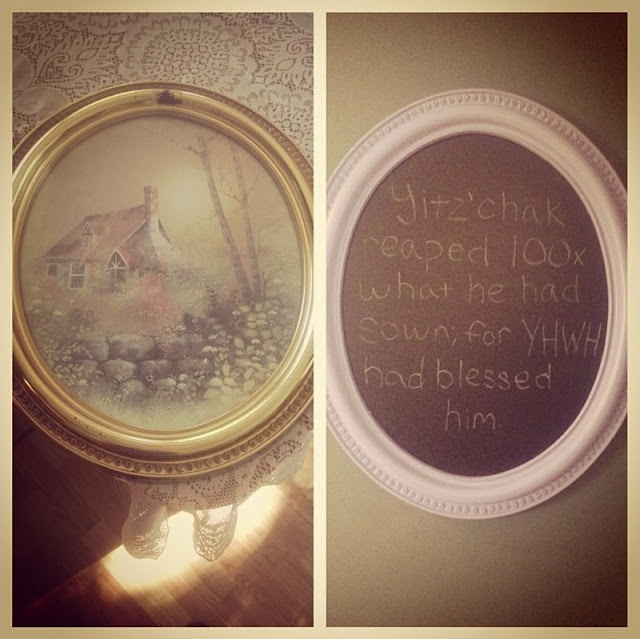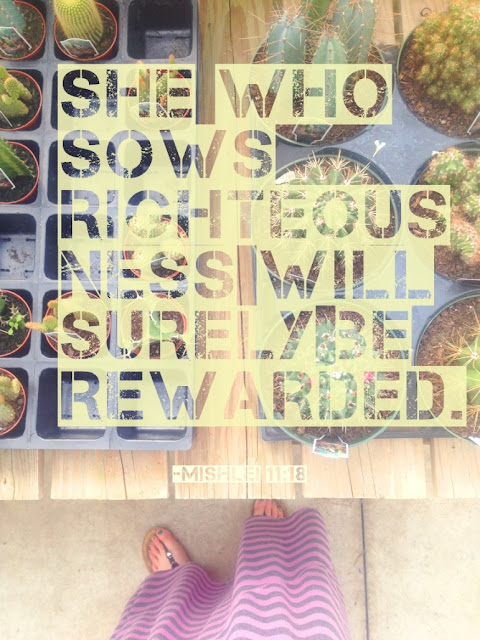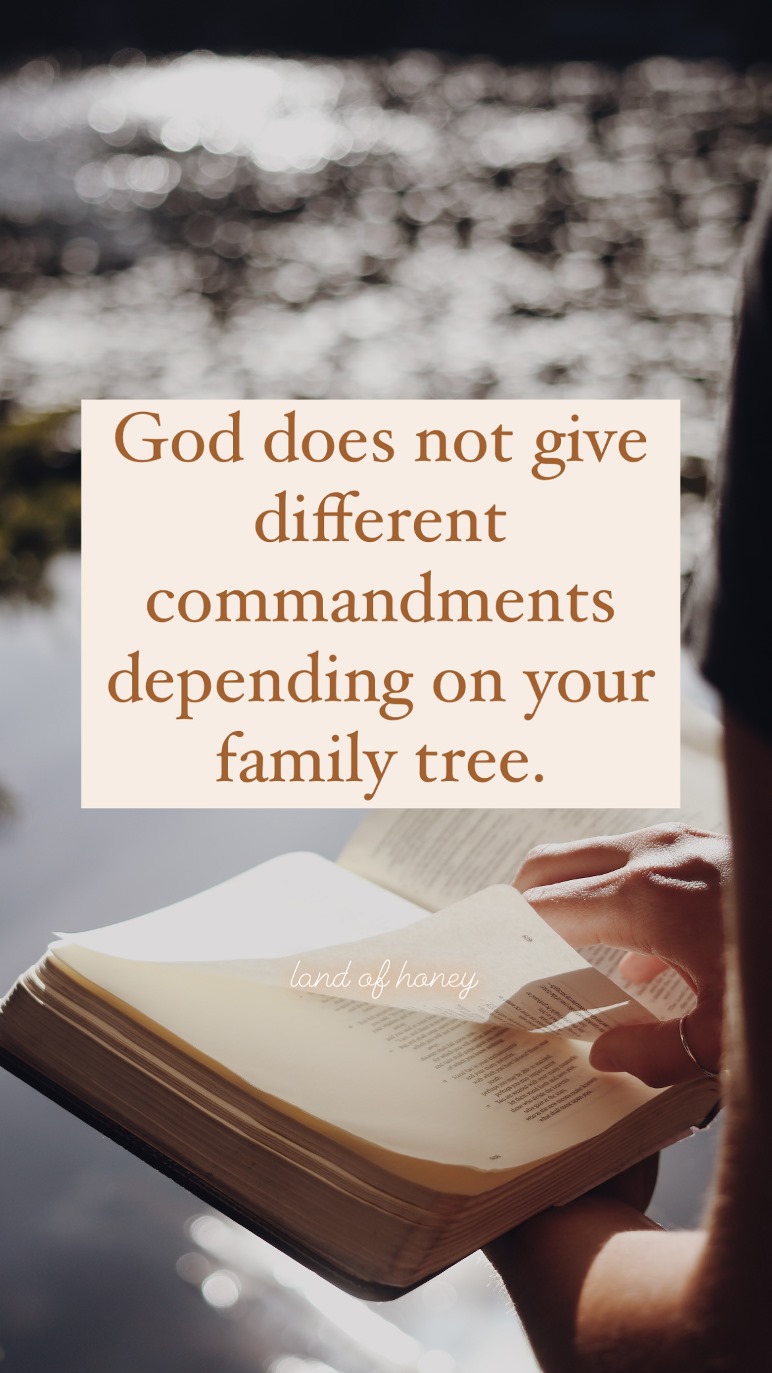Did you know that most of the people in the Bible weren't Jewish? A lot of people don't realize this fact, and discussing any sort of Biblical commandment beyond, 'Thou shall not kill,' I hear this phrase a lot: Biblical law was only for the Jews.
I've started asking a simple question - who are the Jews? - in response to this statement. The responses mention rabbis, those living in the modern country of Israel, people with Jewish ancestry, and, you know, all the people who are in the Bible!
Somehow most of us have been lead to believe that unless you've had a bar mitzvah and find yourself as a member of the modern Jewish religion, then God doesn't really expect you to actually do what he says.
I could not disagree more with this idea because of one simple detail. Most of the people in Scripture were not Jewish.
That's an unusual thought for most of us, but that doesn't mean it's not true. I mean no disrespect to the Jewish people. Indeed there are many people in the Bible, including the Messiah, who were from the tribe of Judah. I'm not arguing that. But we should be aware that Biblical law was given to many more people besides just one tribe of Israel.
In fact, did you know the word 'Jewish' isn't in Scripture all that much? If you do a word search, jewel or jewelry will come up far more often than the word 'Jew.' The words Jew, Jewish, or Judaism actually don't appear even once in the first five books of the Bible (the Torah), and only pop up a few times in the entire Old Testament, mostly in the book of Esther. Jeremiah uses Jew once, as does Zechariah, and it appears twice in Daniel. That's it. (Depending on the translation you're using.)
But, you may be saying, the people of Judah became the Jews. But please note, that does not mean everyone in Scripture.
We've talked briefly before about the fact that Abraham wasn't a Jew. Jacob's son Judah could arguably be referred to as the first Jew, though that's a stretch. I don't call my sister a Jordanite, just Jordan. Anyway, let's take a look at some other famous non-Jews in the Bible.
In addition to Abraham and Sarah, everyone before Judah was not Jewish. Including Adam and Eve, Isaac and Rebekah, Jacob, Leah, and Rachel, as well as Noah and his family. And realistically the people of Judah weren't referred to as Jews for centuries after Judah, the son of Jacob, lived.
Who else in the Bible wasn't Jewish.
-Moses. Yes, the very giver of the law supposedly only for Jews wasn't one himself. Moses, his brother Aaron, and their sister Miriam were from the tribe of Levi. (Exodus 2:1)
-Joshua. The man who lead Israel into the promised land was from the tribe of Ephraim. (Numbers 13:8)
-Caleb. He and Joshua were the spies that came back with the good report and were the only people from the generation that left Egypt to see the promised land. Caleb wasn't a natural born Israelite at all, but a Kenezite who chose to follow YHWH. (Joshua 14:14)
-Rahab. She assisted the Israelite spies in Jericho, but was not an Israelite herself. She is mentioned in the genealogy of Jesus. (Joshua 2:1, Matthew 1:5)
-Gideon. He was the judge who fought in battle to liberate Israel from the Midianites, from the tribe of Manasseh. (Judges 6:15)
-Samson. Israel's most famous judge was from the tribe of Dan. (Judges 13:2)
-Samuel. Israel's last judge and a prophet came from the territory of Ephraim and was raised in the Tabernacle by a Levite. (1 Samuel 1:1)
-Saul. The first king of Israel came from the tribe of Benjamin. (1 Samuel 9:1)
-Ruth. King David's great-grandmother was from Moab. (Ruth 1:4)
-Jeremiah and Ezekiel. Both prophets were from families of Levitical priests. Jeremiah's family resided in the land of Benjamin, and Ezekiel lived in Babylonian exile. (Jeremiah 1:1, Ezekiel 1:3)
-Obadiah. In addition to writing the book of his name, Obadiah hid a hundred prophets from Jezebel and Ahab. Scripture doesn't say for sure but since he worked in the Northern Kingdom of Israel, we have no reason to believe he was from Judah. (1 Kings 18)
-Micah. Being from Moresheth he was not a biological part of Israel, but he was still counted a member of the people of YHWH. God spoke through him to the people as well. (Micah 1:1)
-Elijah. Described as Tishbite from Gilead, Elijah was from one of the ten northern tribes, and not Judah. (1 Kings 17:1)
-Elisha. He was from a city called Abel-meholah in the Northern Kingdom of Israel and was from one of the northern tribes. (1 Kings 19:16)
This list is by no means exhausting. The tribal ancestry of most of the characters in the Bible is not listed. This is also not to say that those grated in or from a different tribe are better or worse than those from Judah. There are exploits of faith and sins attributed to those from Judah and Ephraim. There is no racial superiority in the Kingdom of Heaven, and God does not give different commandments depending on your family tree.
As one of from the tribe of Benjamin wrote in Galatians 3:28, "There is neither Jew nor Gentile...for you all are one in the Messiah Yahusha." In other words, it is irrelevant if you were born Jewish or from another tribe or if you're a foreigner altogether. The Messiah makes his people one. Regardless of your genealogy, all believers are grafted in YHWH's people Israel.














